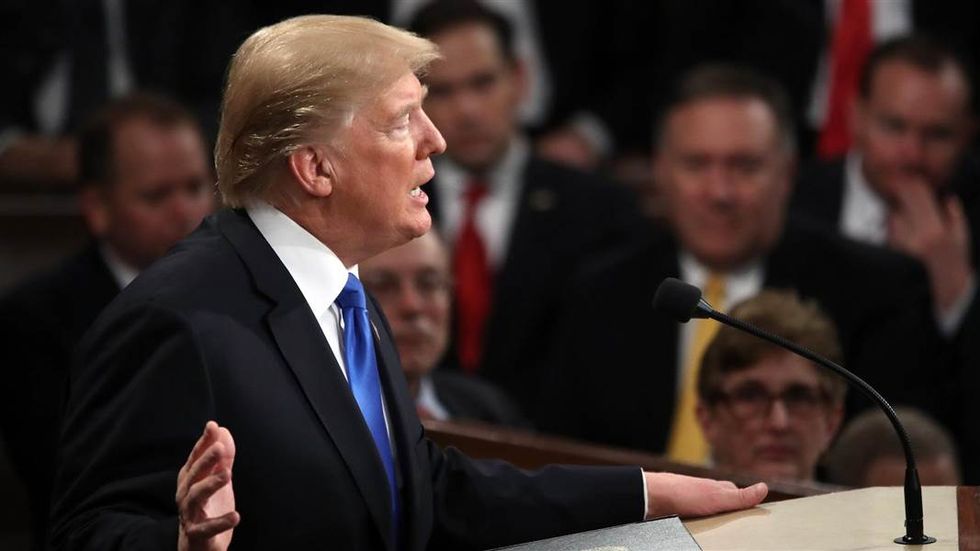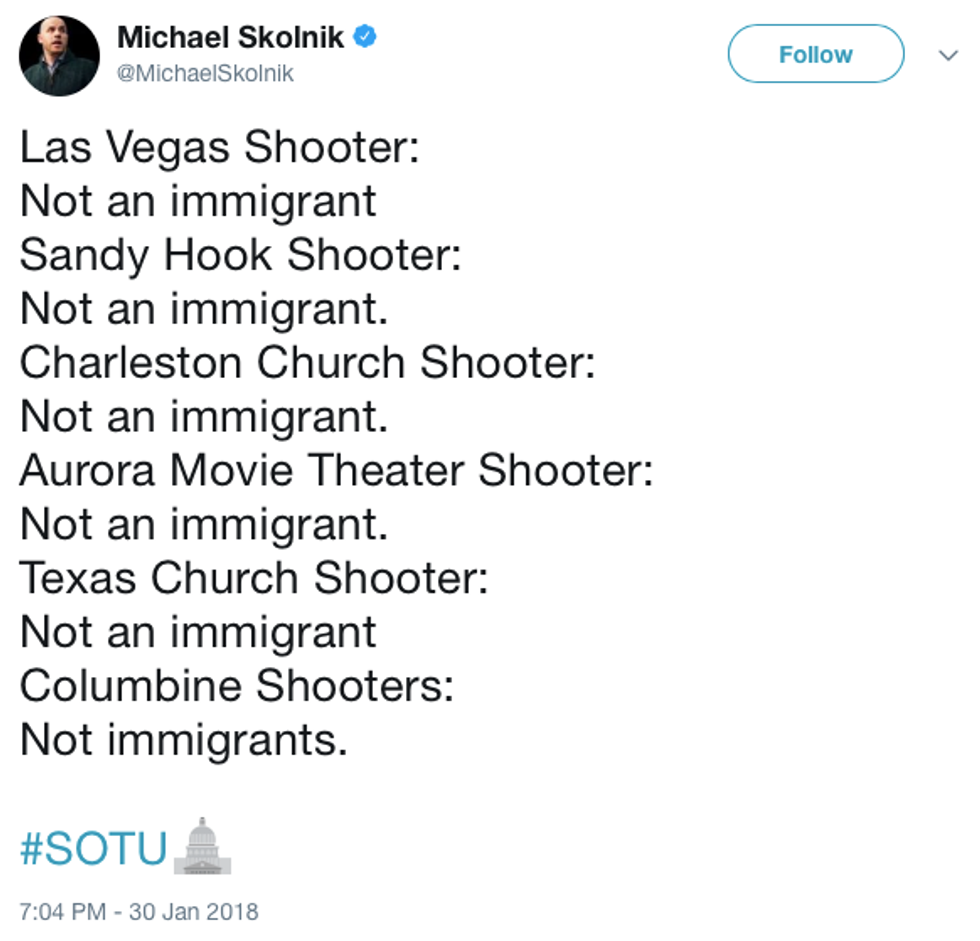There are many reasons why people did not want to watch the 2018 State of the Union at 9 p.m. on Jan. 30.
Many said that they are tired of hearing lies. Others believe that there is no point in contributing to viewership and would read the transcript later. Quite a few are disinterested in the political chaos that our country succumbed to in recent years.
However, there is also a faction of those who did not want to watch because they do not agree with President Donald Trump, and I do not think that is justification.
As someone who staunchly opposes Trump’s rhetoric at every turn and can think of a dozen ways I would prefer to spend a Tuesday night, I also recognize that it is crucial to watch the State of the Union. Yes, the reason I watched was in part because I hope to pursue a career in journalism, and to do so I must be informed, but it is also larger than that.
We cannot expect to form our own opinions if we solely listen to a post-speech analysis. It is crucial to watch these speeches by any president so that we can be aware of what he or she says, how it is said and arguably most importantly, what is left unsaid.
To that last point, Trump spoke in great detail about setting forth on “a righteous mission — to make America great again for all Americans” and his desire to strengthen border control and immigration. He also spoke of strengthening the economy and creating jobs so more Americans can work and unemployment can decrease.
Theoretically, these concepts are great and would be beneficial to our country. Nonetheless, by watching Trump speak, it became clear that there was more on his mind than these ideas. Also, there was unspoken significance behind his remarks on certain topics.
“Over the last year … We have faced challenges we expected, and others we could never have imagined … We endured floods and fires and storms. But through it all, we have seen the beauty of America’s soul …”
The above quotation is true — American citizens witnessed natural disasters and numerous atrocities in 2017 that were previously incomprehensible. What Trump neglected to mention, though, was the spike in hate crimes and violence that we also witnessed.
In November 2017, BBC News reported, “The number of reported hate crimes in the United States has risen for the second straight year in 2016, according to statistics released by the FBI.” According to BBC News, the FBI found that approximately 58 percent of the crimes were related to “the victims' race, ethnicity or ancestry.”
Likewise, although people will persist that hate crimes are isolated incidents or that they were inspired for reasons other than those listed, bigotry in the U.S. is undeniable. What is more, it may not even be so much a “rise” in hate, but a validation that hate is now acceptable under the current administration.
After all, who was still in doubt after the “Unite the Right” rally from Aug. 11-12, 2017, where white supremacists, Klansmen, neo-Confederates and neo-Nazis gathered in Charlottesville, Virginia? The protesters opposed the removal of Robert E. Lee’s statue and chanted antisemitic slogans and carried anti-Muslim banners.
Then, in the aftermath, Trump’s response included the statement that there were "very fine people on both sides”, referencing counter protesters who gathered on the second day, which implied that he was sympathetic to the notion of white supremacy.
Unsurprisingly, topics such as Charlottesville were left unspoken, as it was certainly not a nod to the “incredible progress” and “extraordinary success” that Trump attributed to his administration.
“We are defending our Second Amendment, and have taken historic actions to protect religious liberty.”
As mentioned, the State of the Union was primarily about what Trump did not articulate. Trump mentioned Congressman Steve Scalise from Louisiana, who recovered in three and a half months after being shot in Virginia while practicing with the congressional baseball team.
Likewise, Trump praised “strangers shielding strangers from a hail of gunfire on the Las Vegas strip”, referencing the mass shooting that occurred on Oct. 1 during the Route 91 Harvest music festival. The shooting was perpetrated by Stephen Paddock, and resulted in 58 deaths and 851 injuries.
However, Trump’s echoing defense of the Second Amendment only reaffirms the understanding that the current administration will not move to enact laws making it more difficult to purchase firearms. Additionally, in the case of Paddock, they will not reassess laws that enable individuals to purchase bump fire stocks, which made Paddock’s semi-automatic rifles fire as though they were fully automatic weapons.
Most importantly, there was no acknowledgment from Trump that despite his perception that illegal immigrants are the sole terrorists in our country, there are many homegrown terrorists who are responsible for shootings and violence over the last couple of decades in the U.S.
Moving forward, to the second part of Trump’s quote, it would be remiss not to acknowledge the “religious liberty” that Trump is proud to protect. The comment may be overlooked since it was mentioned quickly. However, it was blatant if one is aware of the ABC News report on Jan. 19 that the Trump Administration called to “protect medical providers refusing to participate in abortion, assisted suicide or other procedures on moral or religious grounds.”
Democrats, LGBT organizations and civil liberties groups rejected the action. Louise Melling, deputy legal director of the American Civil Liberties Union, stated, “They are prioritizing providers' beliefs over patients' health and lives. This administration isn't increasing freedom — they're paving the way for discrimination."
Lastly, although there is much more to analyze from Trump’s first State of the Union address, we must note his reference to NFL players who kneel before games during the national anthem.
“[Preston Sharp’s] reverence for those who have served our Nation reminds us why we salute our flag, why we put our hands on our hearts for the pledge of allegiance and why we proudly stand for the national anthem.”
There is no illusion that Trump and Vice President Mike Pence do not stand in opposition of NFL players who take a knee in protest of police brutality and racial oppression in the U.S. Although his comment was more flagrant than others, he limited his mention of racial tension to the one remark, and continued to overlook the motivation for the peaceful protest.
Overall, the 2018 State of the Union was a greater service to Trump’s ego than an accurate reflection of the last year for our country. He emphasized throughout the address that the U.S. comes together during tragedies and how the country is strong because of its people.
More so, all of his perceived merits do not alter the reality that we are no more unified as a country. Simply observing the chamber, the division was evident based on who stood to applaud Trump and who remained seated with stony expressions.
So, I stand by my original statement: Not watching the State of the Union because one does not agree with the views of the sitting president is not the better alternative. During the Trump era, when facts are labeled “fake” and rhetoric is rampant, the most important thing is to be informed.
It is only through knowledge that we can protect ourselves from illusions or misrepresentations.

















